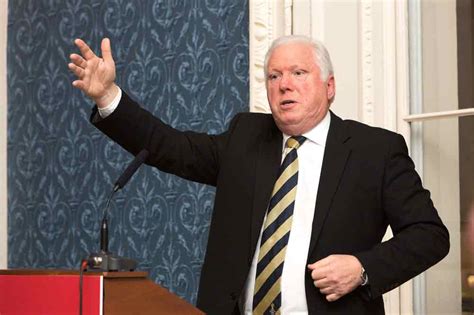A Quote by Robert Reich
As to the meaning of "corporate social responsibility," Friedman and I would agree: If a certain action improves the corporation's bottom line, there's no point in labeling it "socially responsible." It's just good business.
Related Quotes
In the early 1970s, Milton Friedman argued that corporations should not be socially responsible because they had no mandate to be; they existed to make money, not to be charitable institutions. But in the economy of the 21st century, corporations cannot be socially responsible, if social responsibility is understood to mean sacrificing profits for the sake of some perceived social good. That's because competition has become so much more intense.
We need government and business to work together for the benefit of everyone. It should no longer be just about typical "corporate social responsibility" where the "responsibility" bit is usually the realm of a small team buried in a basement office - now it should be about every single person in a business taking responsibility to make a difference in everything they do, at work and in their personal lives.
We need an honest bottom line. Today that bottom line is vastly subsidized. If anyone of us were paying the full cost of oil our bottom lines would be very different. If you internalize the cost of oil, look at the cost of the war in the Middle East or the cost of global warming for future generations, if you internalize those external costs and what you pay, that bottom line would look very different, what ever business you are in.
The ultimate cause of the October Crisis was the ideological embrace of Milton Friedman's warped but still dominant view that "the only social responsibility of business is to make a profit for its shareholders," and until that socially and economically counterproductive - and empirically, legally and ethically inaccurate - view is corrected, we will continue to have the increasing and more intense crises of global capitalism that we have seen recur with ever greater frequency over the past forty years. Sadly but clearly, the lessons have still not been learned.
Ben and I built Ben & Jerry’s on the idea that business has a responsibility to the community and environment If you open up the mind, the opportunity to address both profits and social conditions are limitless. It’s a process of innovation If we were going to have a business we were going to have one that was consistent with our values We measured our success not just by how much money we made, but by how much we contributed to the community. It was a two-part bottom line.
...in place of the Old Bottom Line of money and power, a New Bottom Line of Love and Generosity is possible. People of all faiths need to shape a political and social movement that reaffirms the most generous, peace-oriented, social justice-committed, and loving truths of the spiritual heritage of the human race.
The fortunes amassed through corporate organization are now so large, and vest such power in those that wield them, as to make it a matter of necessity to give to the sovereign - that is, to the Government, which represents the people as a whole - some effective power of supervision over their corporate use. In order to insure a healthy social and industrial life, every big corporation should be held responsible by, and be accountable to, some sovereign strong enough to control its conduct.



































